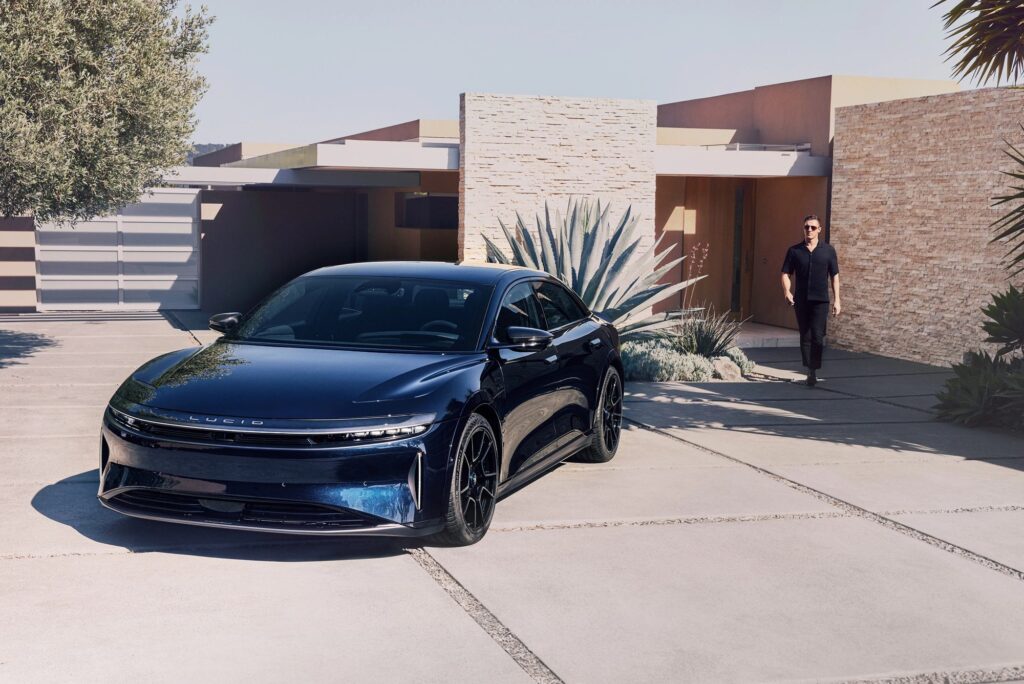
Lucid
Holdings in 59 US companies
Value peaked at nearly $60bn
Big losses on EV maker Lucid
Saudi Arabia’s Public Investment Fund (PIF) has made some big gains but has also been hit by some substantial losses in listed US companies in the five years since it began publishing its holdings, AGBI analysis shows.
Overall, the value of its assets in publicly traded companies in the US has plunged 55 percent from its near $60 billion peak in 2021, driven almost entirely by its holding in the electric vehicle maker Lucid Motors.
From almost $39 billion in 2021, the year in which Lucid sold shares to the public in a flotation, PIF’s holding in the Silicon Valley, California-based company has tumbled to be worth only $5.3 billion now.
For comparison, the S&P 500 index more than doubled, rising 128 percent from March 31, 2020 (the year that PIF’s portfolio was worth just short of $10 billion) to December 31, 2024, the date of PIF’s most recent filing.
Still, in other investments, PIF has made gains, its biggest probably being in the travel technology company Booking Holdings, up more than 3½ times, or an increase of 269 percent.
“Many of the PIF’s US equity investments tie into its ambitions to develop a domestic knowledge economy, buying into gaming, tech and AI-related companies,” says Rachel Ziemba, founder of Ziemba insights, a New York-based advisory company.
“PIF’s opportunistic shifting within its US asset portfolio has been relatively successful,” she says.
PIF was a minor entity on the global stage before Prince Mohammed bin Salman, now the Crown Prince, became its chairman in 2015 and transformed it into the kingdom’s pre-eminent sovereign wealth fund, variously valued now at almost $1 trillion.
In the US, PIF has submitted filings to the market regulator in every quarter since 2020.
Since then, it has invested in 109 listed US companies and now holds shares or call options in 59 companies, the data shows.
Of these, 35 are call options, where PIF has the right to buy a stock at a certain price on a bet that the price will increase.
“PIF is driven primarily by economic considerations,” says Robert Mogielnicki, senior resident scholar at the Arab Gulf States Institute in Washington.
PIF, which did not respond to requests for comment, has bought and sold stakes in 45 US companies including plane maker Boeing, financial services company Citigroup and healthcare company Pfizer, the data shows.
Gains and losses
PIF does not disclose the price at which it buys or sells stocks or exact dates but declares how many shares it owns in a company on the final day of each quarter and their total value. Based on this, AGBI can estimate a per-share price at which PIF bought or sold a stock.
The utilisation of large sovereign wealth funds has economic and non-economic implications, Mogielnicki says, but “PIF’s role in driving domestic transformation or its regional investment offices are not purely financial undertakings.”
As well as gains, the data suggests that many investments have left PIF nursing paper or actual losses, including PayPal (down 67 percent) and Hyzon Motors (down 58 percent).
The average duration of its holdings is a little over 18 months. It invested in 21 companies for a year or less.
Saudi Arabia has pledged to increase trade and investment with the US to at least $600 billion over President Donald Trump’s four-year term. He in turn has called for this to be $1 trillion.
“PIF will be an important instrument in driving activity along the US-Saudi investment corridor,” says Mogielnicki. “We may see some opportunistic snapping up of shares alongside market volatility, but I don’t think the PIF is especially keen on pursuing bad investment deals out of hope for political dividends.”
To mitigate its risk, PIF moved last year into buying call options, the data shows.
The shift suggests that PIF is trying to maximise its returns beyond conventional equity investing, Ziemba says. The fund used to make sizeable investments in US exchange-traded funds before it focused more on individual company stocks.
As PIF needs to invest more domestically, “so it is being creative in how it’s doing its US exposure,” she says.



